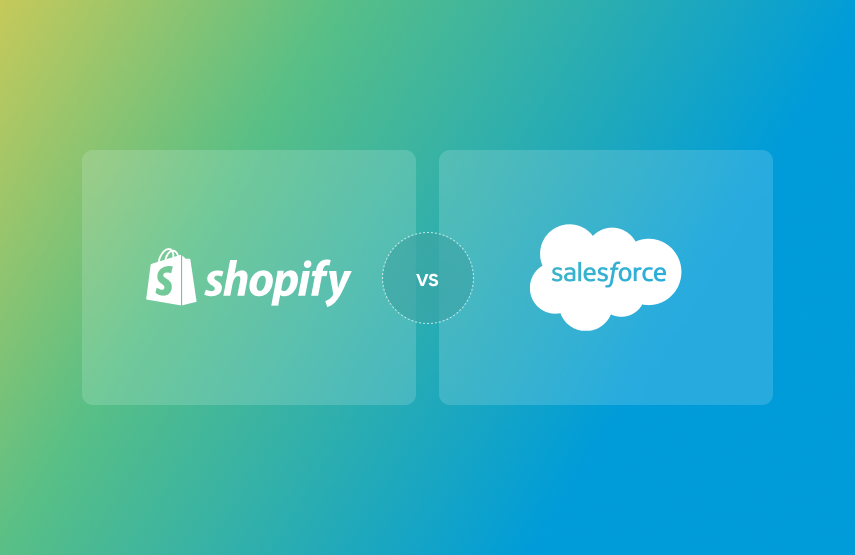Looking to get started with salesforce cloud but don’t know what’s the right cloud type for you? Read out as we compare salesforce commerce cloud vs Service cloud and see which one is best suited for your current business stage…
Salesforce Commerce Cloud VS Service Cloud – What’s the Difference

Now, given the constantly evolving landscape of digital markets and increasing expectations of online shoppers, Salesforce offers various individual modules for online merchants. These modules (known as Salesforce cloud) are developed specifically to maximize the efficiencies of different business functions.
Well, in this blog, we will exclusively be looking and comparing at two powerful and essential modules from salesforce; salesforce commerce cloud vs service cloud.
We will be looking at what features and benefits each of these modules brings to the table for online merchants and if you need any one or both of these modules to achieve desired business outcomes.
So, without any ado, let’s begin our comparison of salesforce commerce cloud vs service cloud!
What is SFCC?
Well, let’s go back in time to see the beginning of the salesforce commerce cloud. Back in 2016, salesforce acquired a software called Demandware, which was a cloud-based ecommerce service provider for small and large businesses.
The Demandware is essentially the parent app for the salesforce commerce cloud. After taking over the software, salesforce integrates various modern features and functionalities into the platform to make it one of the most powerful ecommerce platforms for businesses.
Today, the salesforce commerce cloud brings in various out-of-the-box functionalities, high-utility tools, and automated features to support the sustainability and growth of online businesses.
The platform essentially assists merchants to streamline their business operations including simplifying the payment process, offering a highly responsive (mobile friendly) shopping experience, and personalizing the customers’ shopping experience.
Read Also Launch Cart vs Shopify
With the right salesforce commerce cloud development services, online merchants can essentially create a seamless multi-channel shopping experience for customers, giving them an edge over competitors and improving their chances to maximize revenues.
While commerce cloud comes with interactive tools, you may need a professional Salesforce B2C Commerce developer to help you capitalize on the full potential of the module.
The commerce cloud is also part of the salesforce Digital 360, which is an advanced integrated platform allowing online businesses to engage and sell products and services across multiple digital channels.
Salesforce Commerce Cloud’s Best Features:
Here are some of the worth-mentioning features of the salesforce commerce cloud:
– Commerce cloud digital
Commerce cloud digital is a highly-versatile feature of commerce cloud that enables online merchants to create interactive and fully responsive ecommerce stores.
Commerce cloud digital also enables merchants to integrate their stores over social media platforms to maximize visibility and sales.
The feature also enables merchants to optimize mobile payments and searches, build a branded app, and minimize cart abandonment rates for their stores.
– Storefront reference architecture
The storefront reference architecture is an advanced framework that enables merchants with little or no coding experience to create aesthetically pleasing and highly functional ecommerce stores in no time.
The framework comes with pre-built wireframes and innovative technologies to enable merchants easily create, maintain and grow their online business.
– Commerce cloud endless aisle
The commerce cloud endless aisle allows merchants to integrate multiple shopping channels and offer a unified shopping experience to their customers.
The feature also enables creating personalized customer experiences by allowing them to create wish lists.
Merchants can also give access to customer databases to team members, thereby, improving their chances to create personalized and tailored campaigns to improve conversion rates.
– Commerce Portals
Commerce portals enable merchants to create lasting relationships with customers through loyalty programs, promotional offers, etc.
Commerce portals can also be used to deliver relevant and informative content to customers through communities and social media, assisting them at each stage of their shopping experience.
– Order Management
The order management feature enables merchants to keep a close check on their store’s fulfillment process.
The feature can be used to track delivered, returned, and canceled orders, whereas, it also helps to automate the payment process against online orders.
Benefits of Salesforce Commerce Cloud

– Scalability
With commerce cloud, you can be sure of getting the most advanced features and functionalities to tackle the challenges of today and tomorrow.
The module offers seamless scalability options for merchants, thereby, they don’t have to worry about growth prospects.
The commerce cloud comes with easy integration of new technologies and can handle high traffic spikes and transaction volumes seamlessly.
– Unified commerce
In today’s digital landscape, online shoppers are looking for a well-integrated and unified shopping experience across all digital channels.
With commerce cloud, it is easier for merchants to connect with customers on all digital channels (website, social media platforms, etc.) and run consistent marketing campaigns.
The module also brings in data from all channels, helping sales and marketing teams to accurately map customers’ behavior and shopping patterns across different platforms. With so much data coming in, it’s easier to design tailored marketing and sales campaign that improve conversion rates and maximize revenues for the business.
– Mobile Optimization
According to statistics, over 50% of all online orders are placed using mobile devices. This clearly reflects the importance of mobile-optimized ecommerce stores for merchants.
Commerce cloud comes with a mobile-first approach, offering handy tools and features to enable merchants to create a fully-responsive store or even a branded app to offer an exceptional shopping experience to customers.
Who Uses Salesforce Commerce Cloud?
How about Adidas? Or Beats by Dre, Nautica, Hush Puppies, and more?
Well, it seems like some of the biggest companies are using the salesforce commerce cloud as their preferred platform.
According to statistics, businesses with 50 – 200 employees and with revenues of 1 Million to 10 Million dollars are best suited to leverage commerce cloud features and functionalities. Compared to some other platforms like Shopify, commerce cloud is a comparatively more expensive platform. Plus you may need a professional salesforce commerce cloud consultant to fully capitalize on all functionalities and features offered by the platform.
What is Service Cloud?
Moving on with our salesforce commerce cloud vs service cloud comparison, now let’s dig into the details of the service cloud and what it brings to the table for online merchants.
Unlike the commerce cloud which is more focused on offering an exceptional ecommerce experience by enabling merchants to create seamless ecommerce stores with superior performance, the service cloud is more of a business intelligence system.
The robustness and efficiency of the system are backed by various global success stories.
In today’s digital landscape, merchants need to provide exceptional customer service to be able to achieve healthy growth and sustainability.
With cut-throat competition, any compromise on customer experience will simply eliminate any chances of business growth.
The key to achieving exceptional customer service is by bringing together cross-function teams from marketing, sales, and customer service and share insights to create seamless shopping experiences for customers
The service cloud is essentially the complete customer service system you will ever need. The system is designed to ensure merchants’ readiness to support and assist customers at any time, from any location, and through any platform (phone, email, social media, live chat, etc.).
The module also measures and analyzes key performance indicators for service metrics, thus enabling merchants to streamline their customer experience across all business functions and make it easier for teams to provide personalized attention to customers across all sales channels.
Salesforce Service Cloud Best Features:
– Omni-Channel
Service Cloud enables merchants to engage and communicate with customers across all digital channels using the omnichannel functionality.
The functionality allows businesses to automate the cases of customer engagement coming through different channels to the appropriate agent, thereby, significantly improving the responsiveness and quality of customer care.
The omnichannel functionality of the service cloud enables merchants to cover all sales, marketing, communication, and customer engagement channels from phone, emails, live chat, online forms, video chats, and social media platforms (Facebook, Twitter, Instagram, etc.).
– Case Management
Case management is also a high-utility feature that includes everything required to streamline the process of handling customer queries and concerns.
Some of the modules of the case management feature include, case creation, prioritizing, assigning, reassignment and closure.
The feature is critical in tracking, assessing, assigning, and resolving customers’ complaints on a priority basis.
– Lighting Service Console
Lightning service console works to increase agents’ productivity by presenting them with all essential customer data in a unified way.
The console offers a well-structured and unified approach to presenting all relevant data on a single screen, thereby, improving the agent’s productivity to analyze, and resolve customers’ complaints.
– Process and Routine Automation
Process and routine automation is a crucial tool that helps agents know when they need to offer an extreme and urgent incentive to a highly displeased customer.
The feature uses macros, approvals, and other tools to fast-track the processes, thereby, helping agents to take timely actions to pacify displeased customers.
Benefits of Salesforce Service Cloud
– Customer Data Security
The service cloud comes with robust safety protocols to ensure complete safety and protection of all relevant business data. The feature uses layered safety protocols to protect all sensitive business information generated through all digital channels.
– Improves Productivity of Agents
Salesforce service cloud is essentially focused to improve the ability and capacity of customer service agents to respond to and resolve customers’ complaints.
The module provides agents with the complete data generated from all digital channels in a well-structured and unified way, so they can be more confident in tackling and resolving the customers’ complaints.
– Enhanced Customer Experience
Salesforce service cloud essentially gives you the competitive edge to stay ahead of the competition by enabling you to remain connected with customers through multiple channels at all times. The real-time communication between customers and agents ensures you build strong brand loyalty with an exceptional customer experience.
– Multiple channels of contact
Salesforce service cloud enables merchants to employ all possible communication channels to remain in touch with customers.
From live chat to emails, complaint forms, social media platforms, and others, the service cloud makes it possible for merchants to stay vigilant about customer satisfaction and eliminate any communication gap which may lead to customers’ dissatisfaction.
What Is The Difference Between Salesforce Commerce Cloud VS Service Cloud and Which One Is Suitable for You?
By now you must have had much knowledge and understanding of the differences between salesforce commerce cloud vs service. Cloud. However, just to sum up the differences for you here are some key differences between the two powerful cloud modules from salesforce.
Service Cloud
The service cloud is essentially a customer satisfaction module that enables merchants to create and maintain exceptional customer satisfaction by offering real-time support and services to customers.
The module uses powerful AI-based tools to automate data collection, structuring, and reporting to concerned agents. Some of the reasons to choose the salesforce service cloud include:
- Streamline management of customer support cases
- Assign customer cases to relevant available agents
- Automate admin tasks
- Build interactive reports from data
- Offer exceptionally fast and streamlined support to customers to increase brand loyalty
Commerce Cloud
Commerce Cloud is a SaaS cloud-based ecommerce web platform that helps merchants to create and manage ecommerce stores efficiently.
The module provides merchants with all the necessary tools and features to create the complete infrastructure of the store effortlessly.
While it’s a simple tool, you may need a professional salesforce commerce cloud consultant to fully capitalize on the functionalities of the module. Some of the reasons to choose salesforce commerce cloud include:
- Create aesthetically pleasing, highly functional, and mobile responsive ecommerce stores
- Access Einstein AI to improve shoppers engagement and increase average order value
- Easy salesforce B2B Commerce Integration
- Create account-based rules for better control
So, which one is suitable for you?
If you have read through the entire salesforce commerce cloud vs service cloud, you must be knowing that the two modules serve entirely different purposes, so you can’t pick and choose anyone.
The suitability of each module will depend on your use case and purpose. For instance, if you are looking to get started with an ecommerce store, you may want to start with the salesforce commerce cloud.
Alternatively, if you are looking to boost customer engagement and increase brand loyalty through exceptional customer support services, start an integrated service cloud with your business processes.
Final Words
Still, confused between salesforce commerce cloud vs service cloud?
Well, get in touch with our salesforce experts today to know more about each module and how these can help you with your business requirements. At Folio3, our experienced developers can help you get started with your first ecommerce store through our integrated products and services.
Get started today!
FAQs
What is the difference between SFCC and service cloud?
SFCC is an ecommerce web development platform that helps merchants create highly functional and mobile-optimized stores. Whereas, the service cloud is essentially meant to improve the customer support service for ecommerce stores.
What are the different types of Salesforce clouds?
Given the increasingly competitive digital market, salesforce offers various types of clouds to help merchants streamline different business functions. The major types of salesforce clouds include: sales cloud, service cloud, salesforce commerce cloud, analytic cloud, and experience cloud.




